The UK government has launched a £15 million ($21m) ‘Green Fuels, Green Skies’ competition to support early-stage development of UK sustainable aviation fuel (SAF) plants with grant funding. Specifically targeted are projects undergoing a front end engineering design (FEED) stage in their development lifecycle and will prioritise those projects closest to the development of first-of-a-kind (FOAK) commercial-scale SAF plant. The competition will also be open to projects outside this scope and will allocate up to £2 million in funding to projects at the feasibility stage of project development. The competition is part of UK Prime Minister Boris Johnson’s ‘Ten point plan for a green industrial revolution’ unveiled in November. The announcement coincides with the second meeting of the Jet Zero Council, set up by the government last year in partnership with industry and others to stimulate net-zero emissions flight by mid-century through the development of new aviation fuels and technologies. Heathrow Airport COO Emma Gilthorpe has been appointed CEO of the Council, with a brief to extend its reach with key stakeholders across the sector and drive forward aviation decarbonisation. Meanwhile, the government is to provide £5.5 million in funding towards modernisation of UK airspace.
Commenting after the Council meeting, UK Transport Secretary Grant Shapps said: “As the aviation sector emerges out of the pandemic and looks towards recovery over the coming months, we must put our environmental commitments at the centre of everything we do – so not only do we build back better, we also build back greener. That’s why we’re stepping up our work on the Council, recruiting new members and launching pioneering efforts to ensure we continue to lead the world by example and deliver on our ambitious net-zero targets.”
Added Business Secretary Kwasi Kwarteng, who co-chairs the Council with Shapps, said: “The meeting demonstrates the vital collaboration between government and industry that will make zero-emission flights a reality. Britain’s aerospace sector is at the centre of our plans to build back greener from the pandemic. We are committed to supporting its recovery and investing in green tech to take us closer to zero-carbon take-off.”
One of the objectives of the Jet Zero Council is to accelerate SAF delivery by supporting investment in FOAK SAF plants, supporting R&D of new pathways and to drive down production costs through upscaling and innovation. The ‘Green Fuels, Green Skies’ (GFGS) competition is being run by the Department for Transport (DfT) in partnership with E4tech and Ricardo Energy & Environment, who were also responsible for the Future Fuels for Freight and Flight competition that was launched in 2017 and had applications for funding from the Velocys Altalto waste-to-jet project and the LanzaJet SAF from waste-based ethanol project.
The new competition follows on from a DfT-commissioned study by E4tech and Ricardo to assess the feasibility of a grant-funded competition and the types of funding mechanisms that could help support FOAK commercial SAF plant development in the UK. The study concluded there was a pool of UK and international developers that could build such plants but technology risk, high capital costs and uncertainty on the monetary value of policy support meant there were key barriers that needed to be overcome. It found that FOAK commercial plants could cost £600-700 million ($830-$970m) to build, which required government to “think big”, with policy measures to provide sufficient revenue certainty to investors to make projects financially viable.
The study indicates a UK SAF market could generate between £700m and £1.66bn in gross value added (GVA) to the UK economy, with potentially half of this being generated from the export of IP and the provision of engineering services, and create between 5,000 and 11,000 green jobs. Replacing imported kerosene with domestically produced SAF would also increase fuel security and have a net positive impact on the UK’s balance of payments.
The competition sets a number of objectives for projects to receive financial support:
- Technology demonstration: materially progress a project towards FOAK commercial production of an eligible SAF pathway.
- Fuel production: materially develop a project with the capability to produce commercially significant volumes of SAF, including for the purposes of attaining certification.
- Commercial potential: materially develop a strategy for commercialising the technology and the products from the project, demonstrating the significant value to the UK.
- Emissions reduction: demonstrate the potential for GHG reductions of a technology pathway compared to a fossil fuel equivalent.
- Project execution: bring together a team with the necessary expertise and experience to deliver the project according to its objectives.
Application forms for the competition are available to download from the Ricardo website on March 24 and the closing date for applications is May 31. The DfT expects to announce the winners and the start of the funding period at the end of July, with the funding period for winning projects due to end on March 31, 2022.
“This funding is a positive step closer to getting a British sustainable aviation fuel industry off the ground,” commented Adam Morton, Chair of the UK cross-industry group Sustainable Aviation. “But if the UK is serious about becoming a world leader in SAF production and supply, the government must accelerate its support for this nascent industry by complementing this funding with the right policies to support the commercialisation of SAF at scale, as we have set out. With a world-leading SAF industry and innovations in electric and hydrogen aircraft, Britain can become a Jet Zero pioneer.”
Under another initiative, ‘Future Flight Challenge’, the UK government has committed £125 million ($173m) of funding over four years, matched by £175 ($243m) million from industry, to develop green flight – such as all-electric aircraft and deliveries by drones – by advancing electric and autonomous flight technologies. Project 2ZERO announced plans this week to use their £2.4 million share of this funding to demonstrate flights of six- and 19-seat hybrid-electric planes. The project will validate the use of electric and hybrid aircraft on regional routes, showing the potential to decarbonise aviation while supporting regional connectivity.
Following an independent review into UK transport connectivity, the government has said a consultation will be launched shortly on aviation tax reform that will include options to change Air Passenger Duty (APD) for domestic flights, such as reintroducing a return leg exemption or creation of a new lower domestic rate. It will also consider increasing the number of APD international distance bands as well as mandating the use of sustainable aviation fuels. As some European governments move towards closing down short domestic routes in favour of train travel, Prime Minister Johnson said he wanted to cut APD on domestic flights to support UK connectivity.
Asked by BBC Radio this week on how a cut in APD on domestic flights would square with the government’s net-zero commitment, Transport Secretary Shapps said: “We want to do both and we’ll do that, for example, by using sustainable aviation fuel mandates in future on domestic flights to remove carbon.”
The government has also announced funding of £5.5 million ($7.6m) to support modernisation of the UK airspace to reduce journey times, pollution and delays. It said the funding would aid the industry as it develops and evaluates new flight routes, and play a role in the UK CAA’s Airspace Modernisation Strategy when travel restrictions are lifted.
“As an island nation, our airspace is vital in keeping us connected to the rest of the world,” said Aviation Minister Robert Courts. “Modernising our ‘sky motorways’ could put an end to the days of circling the airport waiting for a landing slot, improving efficiency, and leading to flights that are quicker, quieter and greener than ever before.”
Responding, the UK Airport Operators Association’s Chief Executive, Karen Dee, said: “Airspace modernisation will be essential for aviation to build back better, so that a recovery of 2019 passenger levels does not come with 2019 noise impacts and carbon emissions. We look forward to working with the government and the Airspace Change Organising Group to deliver modernisation and to help achieve aviation’s net zero by 2050 commitment.”
The government says it has pledged around £7 billion ($9.7m) for the aviation sector since the start of the pandemic “while working to develop a framework for the restart of safe and sustainable international travel.”
Photo: Heathrow Airport





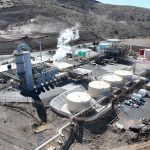
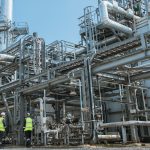
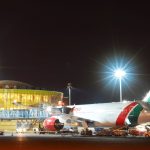

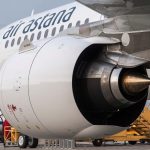

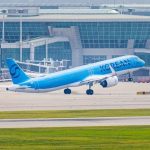


More News & Features
LanzaJet produces first next generation, ethanol-based SAF at flagship Freedom Pines refinery
European Commission announces Sustainable Transport Investment Plan to advance low-and-no-carbon fuels
XCF plans three new Australian SAF plants, while Wagner and FlyOro activate blending facility
UK government starts new consultation on SAF revenue certainty mechanism
African Development Bank and Japanese industrialist unite to explore SAF production in Africa
LanzaJet and KMG agree to progress SAF production project in Kazakhstan